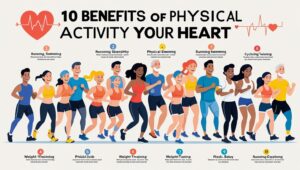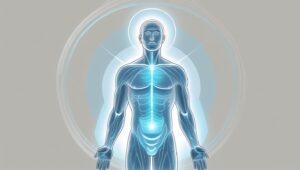In a time when individuals are spending more time sitting than standing, heart disease has emerged as one of the top causes of death worldwide. Even with the bleak statistics, one of the strongest, most cost-effective, and most available instruments of heart health is something that’s within everyone‘s grasp: exercise. Your heart, a muscle that pumps more than 100,000 times a day, responds to motion. Exercise not only makes the heart strong but also assists a sophisticated interlocking system of circulation, metabolism, and mental health.
In this in-depth article, we are going to take a look at the top 10 science-backed advantages of physical fitness for your heart, with information on how these benefits function and how you can begin taking advantage of them—regardless of age or present level of physical fitness.
Must Read: 8 Morning Routine Habits That Will Change Your Life

Strengthens the Heart Muscle
Like any other muscle in the body, the heart becomes more powerful as it is used regularly. Cardio exercises like walking, running, cycling, and swimming train the heart to perform more effectively. Gradually, a trained heart can pump more blood with fewer beats, decreasing stress and improving endurance. A stronger heart also decreases your resting heart rate and aids long-term cardiovascular efficiency. Moderate exercise on a regular basis induces left ventricular hypertrophy in a healthy manner, i.e., the left ventricle of the heart becomes slightly enlarged and stronger — pumping blood more forcefully and efficiently throughout the body.
Must Read: 9 Benefits of Protein for Health and Athletic Performance
Reduces Blood Pressure
High blood pressure (hypertension) is a leading cause of heart attack and stroke. Regular exercise widens blood vessels and increases elasticity, reducing the resistance against which the heart has to pump. Aerobic and resistance training have both been found to decrease systolic and diastolic blood pressure, even as effectively as drugs in the early stages of hypertension. Moreover, regular movement can help individuals reduce stress, which is often a hidden contributor to elevated blood pressure. Over time, these changes lessen the workload on the heart and decrease the risk of cardiovascular events.
Must Read: The 9 Best Diet Plans: Sustainability, Weight Loss & More
Improves Cholesterol Profile
Must Read: How Does Exercise Improve Mental Health?

Increases Circulation
Exercise enhances the effectiveness of your circulatory system. When you exercise, your heart beats more quickly, and the blood vessels widen to handle the extra requirement for oxygen. This increased circulation allows for better delivery of nutrients to your muscles and organs, including your heart. Enhanced circulation also helps eliminate waste products in the body, lowering the risk of blood clots, and decreasing the possibility of peripheral artery disease (PAD), where a decrease in blood flow to the limbs occurs.
Assists Weight Control
Lowers Risk of Heart Disease
Individuals who are regularly active reduce their risk of heart disease by 20%–30% compared to those who are not active. Exercise directly attacks a number of the risk factors: it decreases blood pressure, improves cholesterol, inhibits inflammation, and helps level out blood sugar. Heart disease does not occur overnight but develops over the year. Exercise is a preventative solution by constantly keeping your heart and blood vessels healthy, making it more difficult for disease to establish itself.
Manages Blood Sugar and Lowers Risk of Type 2 Diabetes
Decreases Inflammation in the Body
Chronic inflammation is an underappreciated, yet essential, cause of heart disease. It is primarily responsible for the development of arterial plaque and its rupture — the most common cause of heart attack. Regular exercise lowers inflammatory markers such as C-reactive protein (CRP), interleukin-6, and TNF-alpha. Exercise also enhances the function of the endothelium, the lining of the blood vessels, so that it can better regulate inflammation and vascular well-being. In other words, exercise creates an internal environment in which inflammation is lowered, something important in the prevention of clogging up the arteries and hardening of the heart.
Must Read: 8 Morning Routine Habits That Will Change Your Life

Boosts Mood and Eases Stress
Enhances Sleep Quality
Individuals with regular physical activity are more likely to fall asleep quicker and have better sleep quality, which enhances recovery and heart function in the long run.
Must Read: Psychological Benefits

Conclusion
Small, regular steps — such as taking 30 minutes a day for a walk, opting for stairs instead of the elevator, or dancing in your living room — can significantly better your heart health in the long run. Regardless of your age, gender, or fitness level, it‘s never too early to make a change.
So, move more, sit less, and treat your heart the way it deserves. It‘s one of the easiest and strongest things you can do to add life to your years — and years to your life.
FAQs

Zain Ul Hassan is the founder of Zaha Fitness. He writes practical, research-backed articles on fitness, weight loss, and natural health. His goal is to help people live healthier lives using simple and effective tips.
